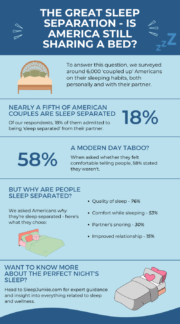Books and Bedtime

Grabbing a book before bedtime is routine for many people. Yet, how and when you read in bed can impact the quality and quantity of your sleep.
Experts in many fields have said their love for reading contributed to their success. Overall, reading informs and educates us, allowing us to explore new topics and learn about others.
Before the rise of technology, grabbing a hardbound or paperback book was one of the few options for reading in bed. Now we have access to smartphones, electronic tablets, laptop computers, and a host of other tech devices. So if reading is beneficial, does it matter how we read before bedtime?
We surveyed over 2,300 individuals to inquire about their sleep habits and how much they read in bed. We narrowed that down to about 1,000 people who fell into one of two groups: The first cohort were frequent bedtime readers – averaging five or more nights each week – while the other group rarely, if ever, read in bed.
Whether you’re reading this in bed or on your daily commute, stay with us as we examine how people’s bedtime reading habits help or hinder their sleep.
Bedtime Reading
How often do you read in bed? If you’re like a majority of our respondents, it might not be often. Experts, however, have long suggested that reading in or before bed helps you relax and improves the quality of your sleep. .
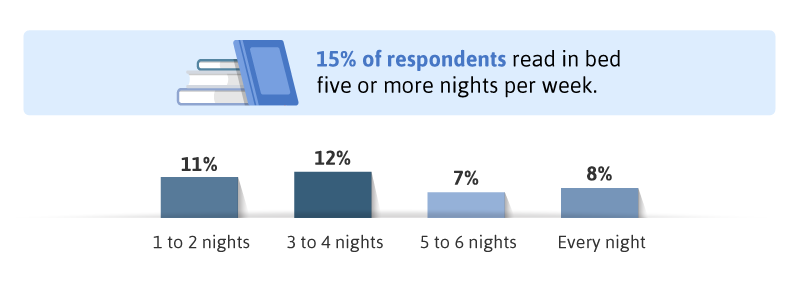
Only 15 percent of our respondents said their reading habits included five or more nights each week. Another 11 percent read one to two nights each week, and 12 percent said they picked up reading material three to four nights a week.
For many, reading in bed helps reduces stress. Others maintain that bedtime reading improves their memory and even makes them more empathetic toward others. As we’ll see when evaluating the responses, the method by which you read in bed can determine your sleep habits.
Reading in Bed Is Good
Many times, people need help falling asleep. Our daily activities often keep us busy and mentally engaged, sometimes making it difficult to shut down enough to receive the full benefit of a sound night’s sleep.
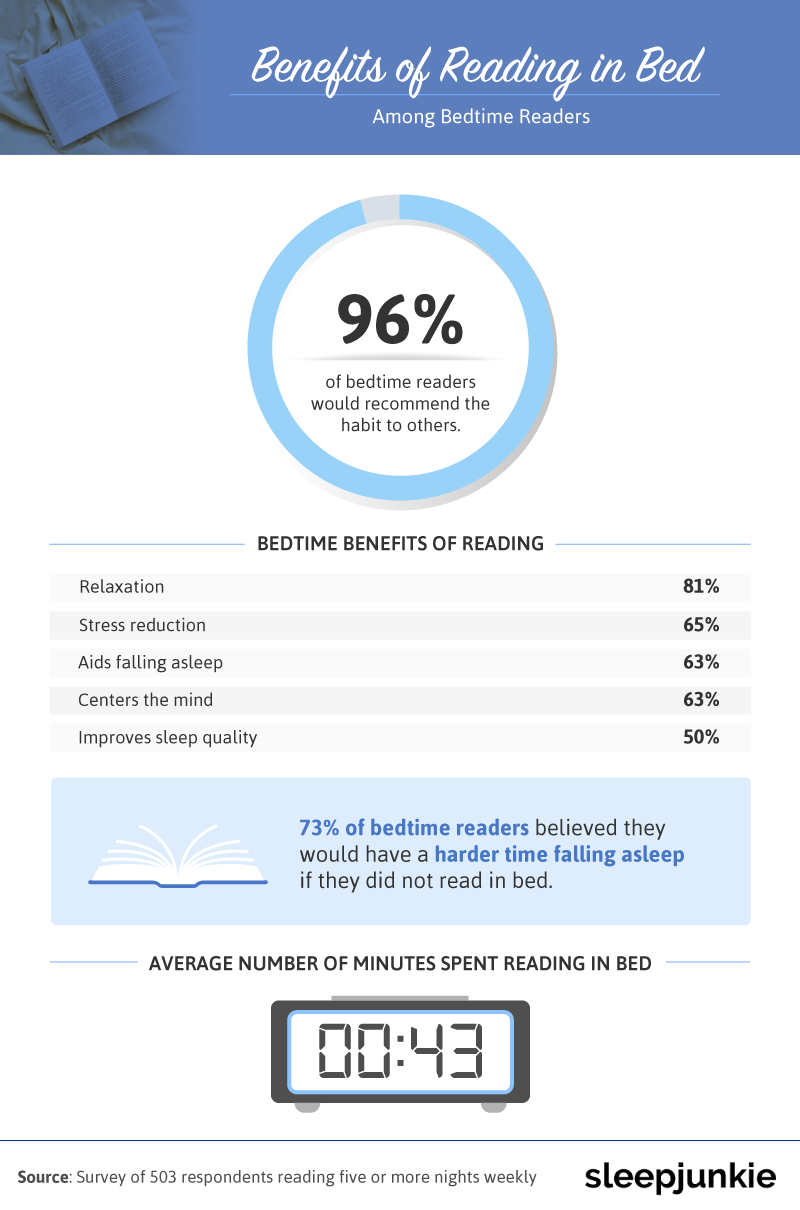
Among those who read in bed five or more nights weekly, the average time spent reading was 43 minutes.
Bedtime readers have long maintained reading helps them fall asleep and is good for their mental well-being, as confirmed by 63 percent of our frequent bedtime reading participants. There are other benefits as well.
Over 80 percent said reading in bed was relaxing. Another 65 percent indicated reducing stress was a benefit they enjoyed. Fifty percent said they slept better.
Frequent bedtime readers are strong advocates for the practice: 96 percent recommended the ritual to others. That’s most likely because 73 percent believed falling asleep would be harder if reading in bed wasn’t a part of their routine.
After all, there is a direct correlation between ample sleep and other aspects of one’s life. Suffice it to say, if being your best every day is important, then getting quality sleep is critical.
How Bedtime Readers Read
Although most people have access to one or more electronic devices today, almost half of our respondents still preferred reading a printed book in bed. Approximately 40 percent chose to read on an e-book device, while 17 percent read on their phone or tablet.
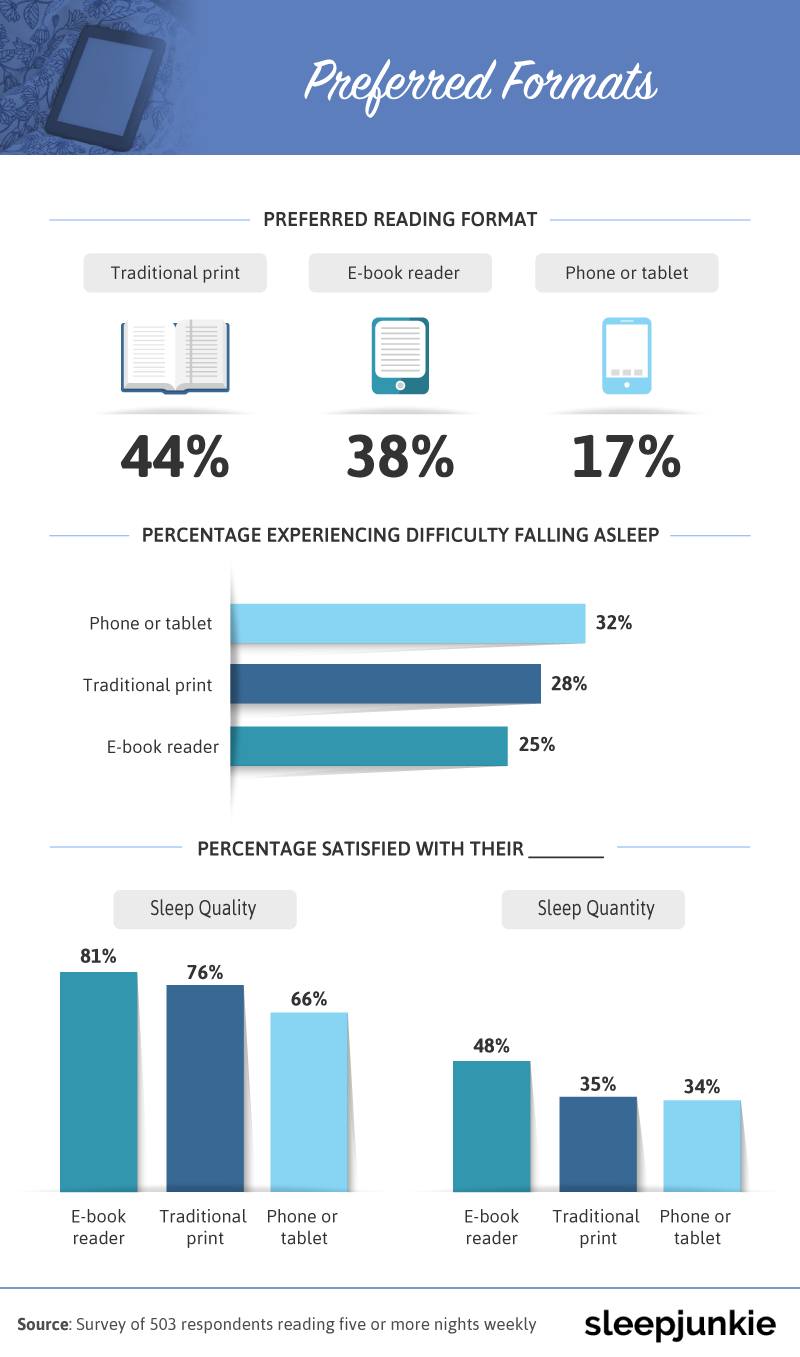
Among respondents who read in bed via a phone or tablet, 32 percent typically struggled to fall asleep. Twenty-eight percent who read traditional print books had problems drifting off.
A part of the problem may be how electronic devices emit a specific type of light that often physiologically and psychologically stimulates the brain, delaying the body’s circadian rhythm, or its internal body clock. This light can also suppress the release of melatonin, a sleep-inducing hormone.
Surprisingly, only 25 percent of bedtime readers using an e-book device reported trouble falling asleep. This is likely because many e-books use special technology, often referred to as “electronic paper,” designed to mimic the appearance of ink on paper.
Along similar lines, 81 percent who read bedtime materials on an e-book device were satisfied with their sleep, compared to 76 percent who read traditional books. Only two-thirds of phone and tablet readers reported satisfactory sleep quality.
Sleep quantity was a slightly different story. Almost half of the e-book readers were satisfied with their sleep quantity. Phone or tablet readers and traditional print readers were virtually tied at 34 and 35 percent, respectively. Much like the rest of us, bedtime readers also seem to feel like they’re never getting enough sleep.
Rating Our Bedtime Sleep When Reading
For a myriad of reasons, bedtime readers reported a higher quality and quantity of sleep than those who did not read.
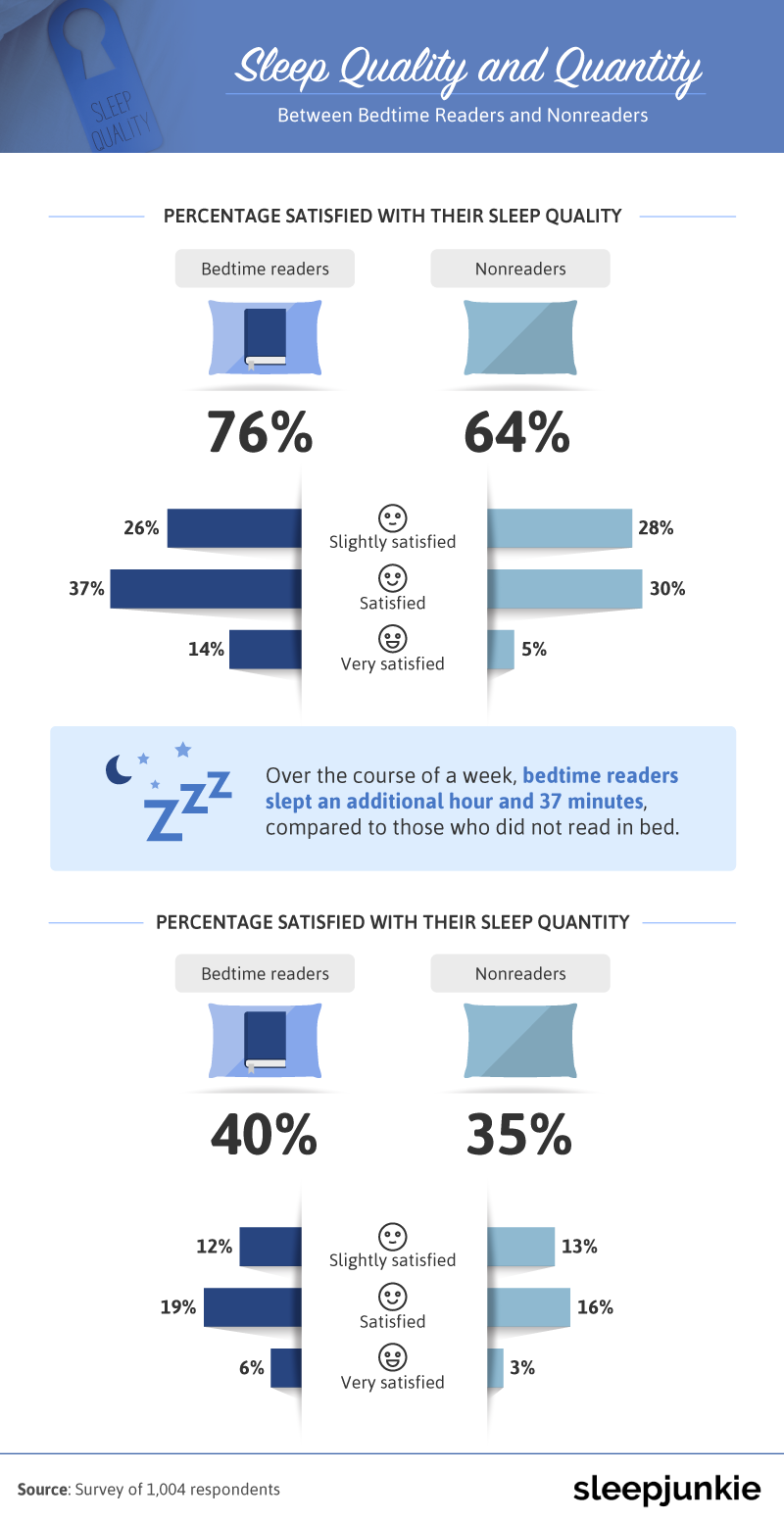
Overall, 76 percent of bedtime readers were satisfied with their quality of sleep versus 64 percent of nonreaders. Of bedtime readers saying they were very satisfied, the percentage was almost three times higher than for nonreaders.
When we measure the length of sleep, a few minutes each night doesn’t sound like much. But when you evaluate those minutes on a weekly, monthly, or annual basis, those lost minutes add up. Bedtime readers in our survey averaged slightly more than 90 minutes of sleep each week. That equates to about 78 hours, or slightly more than three days of lost rest each year.
Suffice it to say, 40 percent of bedtime readers were satisfied with their quantity of nightly sleep, whereas 35 percent of nonreaders said the same.
Reading aside, sleep experts suggest following a bedtime routine because getting under the covers at about the same time each night has shown to be beneficial. Additionally, trying to avoid intensive exercise and caffeinated beverages in the hours preceding bed is a good idea.
Improving Your Health and Income Through Bedtime Reading
Would you like to earn a higher income, eat better, and live life more fully? If so, then reading in bed could be an important component of making those healthy lifestyle changes.
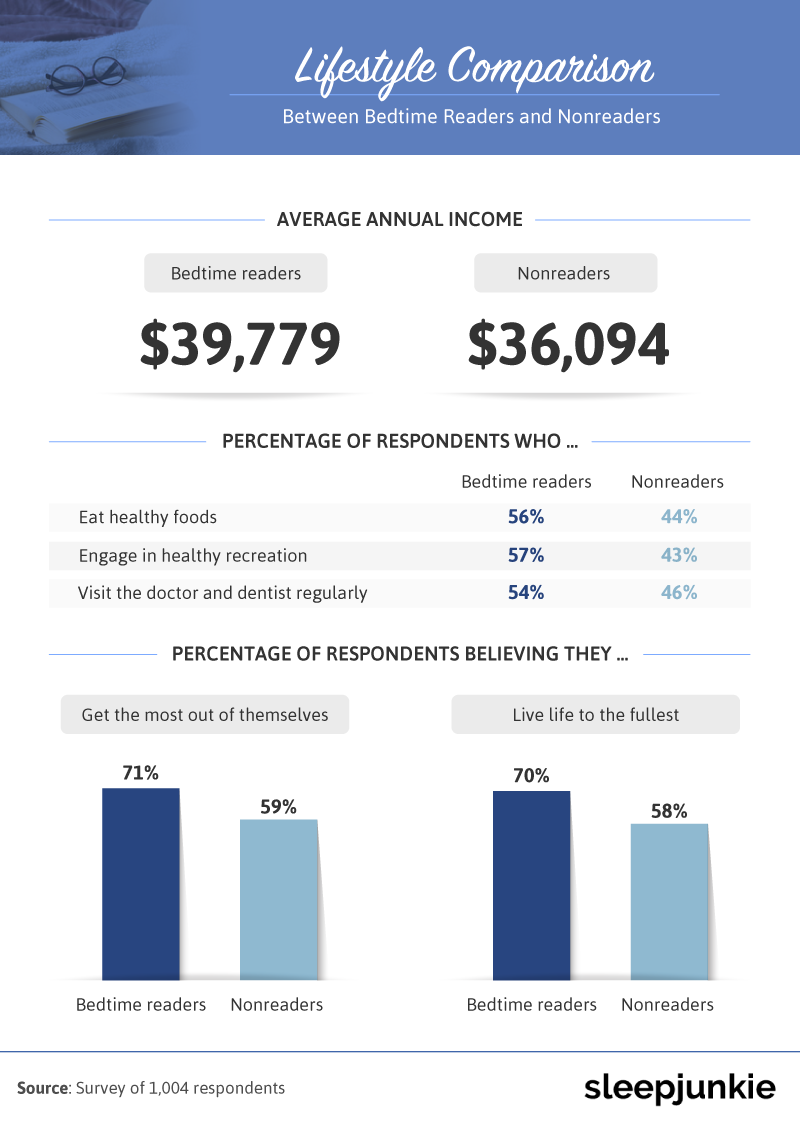
Let’s examine income first. Bedtime readers reported an annual income just under $40,000 annually. Nonreaders fell shorter, reporting yearly earnings of just over $36,000.
Maybe it’s because bedtime readers are consuming material on how to improve their business skills or lead a healthier lifestyle. Our respondents who read in bed tended to eat healthier, participate in recreation activities at a higher rate, and visit their health care providers on a more consistent basis than those who did not read.
One reason may be reading before or in bed has been shown to reduce stress and improve long-term memory. Regardless of the tangible benefits received through bedtime reading, the right mindset can make a big difference; just believing that you feel or perform better in other areas can be highly beneficial.
Approximately 7 in 10 bedtime readers believed they get the most out of themselves and live life to its fullest. Nonreaders trailed by 12 percentage points in both areas.
Consistency Is Key
Productivity experts have long concluded that consistency is the key if you desire to improve or master any skill or activity. However, there is a downside to consistency. If you consistently engage in poor habits, the result can produce detrimental effects.
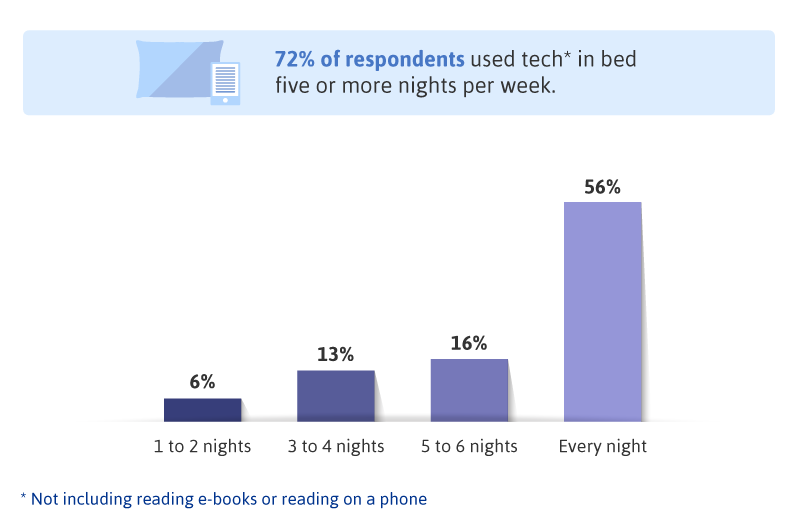
Would it surprise you that 72 percent of those surveyed admitted to using tech in bed at least five nights per week?
Here’s the breakdown: 56 percent said they use tech gadgets in bed every night, 16 percent admitted using them five to six nights, 13 percent three to four nights, while 6 percent used gadgets one to two nights each week.
Children tend to use technology at more substantial rates than many adults today. A recent scientific study exposed some negative consequences when children watch TV at bedtime since they were more likely to be overweight. In our study, bedtime tech users – those who used tech in bed five or more nights weekly – also revealed some concerning trends.
Keeping Your Tech Out of Bed
Let’s face it: Your tech may be keeping you up much later at night. One prime example is our finding that 61 percent of bedtime tech users stayed up too late several nights each week.
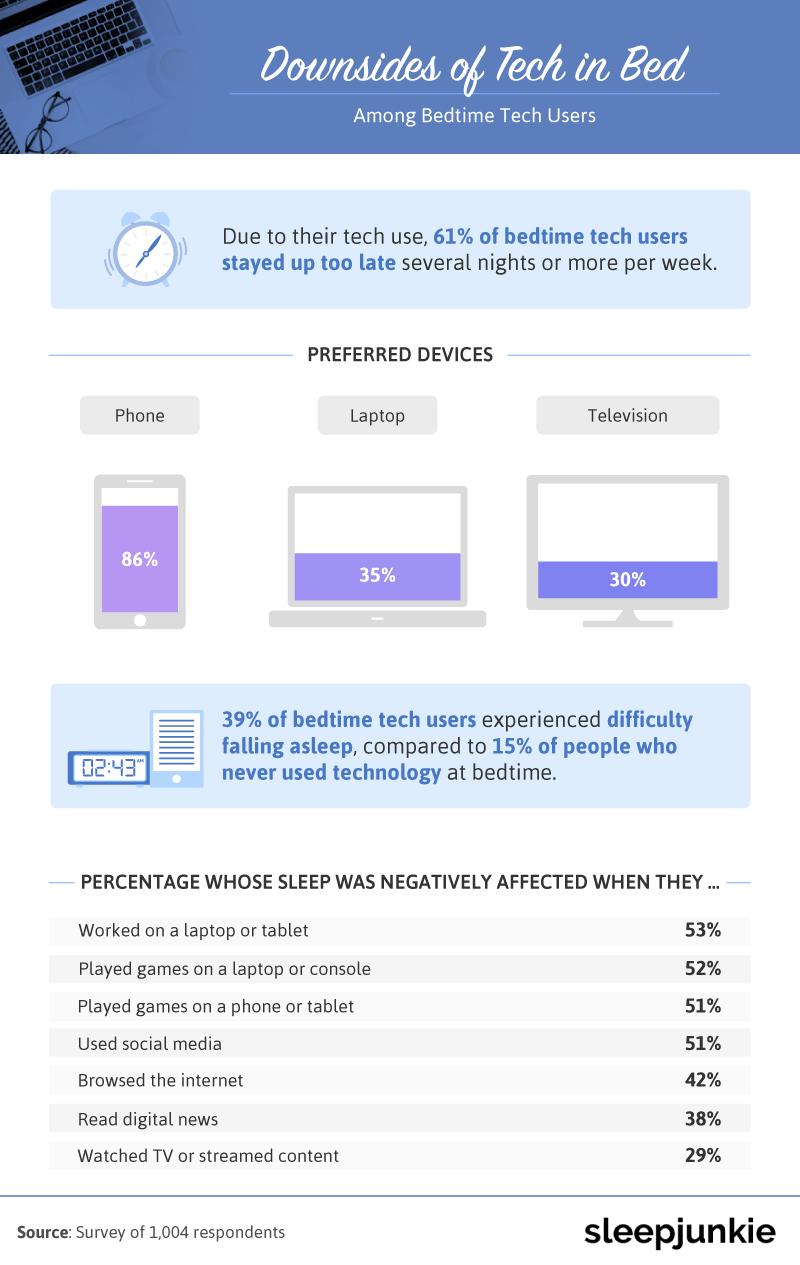
As reported by 86 percent of respondents, the tech device used most often in bed was a phone.
Laptops make it a breeze to work on the road or in remote locations such as coffee houses and restaurants. Yet, only 35 percent of those surveyed named them as their preferred bedtime device. Trailing by a few percentage points were TVs. One apparent reason may be that most network, cable, or streaming service programs can also be viewed on smartphones, laptops, and tablets.
Regardless of the technology used, more than twice the percentage of respondents reported they had trouble nodding off immediately after using one compared to those who didn’t.
Weaning Off Tech
We’ve seen that using tech devices before drifting off can sometimes interfere with sleep, and the consensus is unanimous even among tech users. Nearly three-fourths of people who used these gadgets at bedtime agreed they would benefit from cutting back.
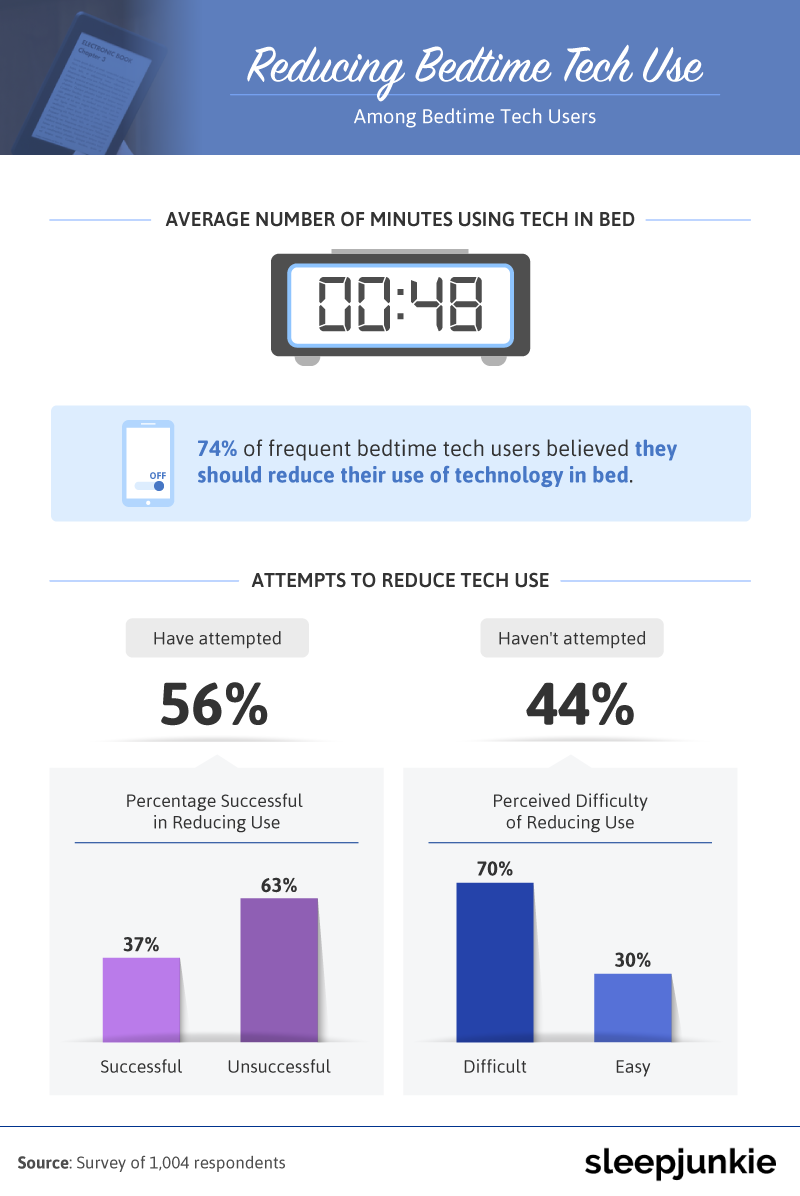
Among those who used tech devices in the late evening hours, the average person spent 48 minutes staring at a screen in bed.
Among the 56 percent of people who put in the effort to reduce their bedtime tech time, almost two-thirds discovered the difficulty of weaning themselves from the devices and were unable to do so. Only 37 percent of people who tried to reduce their bedroom tech usage were successful.
Of the 44 percent who hadn’t tried to set their gadgets aside when hitting the hay, 70 percent believed any attempt would be a struggle.
One effective strategy is keeping such devices out of the bedroom and reserving your sleeping space as a tech-free oasis designed to calm you down and not rev you up. Another idea is making sure your notifications and news alerts are turned off an hour or so before bed.
Reading Helps You Sleep, But We Can Too
Few will argue against the fact that reading in bed helps you fall asleep faster and most likely improves the quality of your sleep. At Sleep Junkie, we care about your sleep. After all, it’s our business to help you be rested each day. Whether it’s the best mattresses, pillows, or mattress in a box comparisons, we’re your one-stop shop for everything sleep-related.
Like you, we love technology too! We use it every day to bring you the latest information on how to get a great night’s sleep. We also realize our tech devices can deter our rest, so here’s our challenge: Pick up a book at your favorite bookstore and settle in for a good read – minus your tech devices. Based on this survey, we’re confident you will doze off more quickly and rest comfortably.
Methodology and Limitations
For this study, we surveyed 2,309 people in total. A smaller percentage – 1,004 people in total – comprised a majority of our findings. Of those 1,004 respondents, 503 were frequent bedtime readers, and 501 read infrequently or never. To help ensure accurate findings, all 1,004 respondents were required to pass a hidden attention-check question. The average respondent was approximately 37 years old; the approximate average age of a bedtime reader was 38; and the approximate average age of a nonreader was 36.
In some cases, questions and answers have been rephrased or condensed for clarity or brevity. These data are intended for entertainment purposes only. These data also rely on self-reporting. Statistical testing has not been performed on these findings. Due to the nature of self-reporting, potential issues include but are not limited to the following: selective memory, telescoping, attribution, and exaggeration.
Fair Use Statement
If you believe this information about reading and sleep is valuable to your readers, then by all means, please share it freely as long as it’s for noncommercial purposes. All we ask is you link back to this page so that those interested may read the complete analysis of this survey.
Sources
https://www.nicabm.com/brain-electronics-the-brain-and-sleep54892/
https://www.ncbi.nlm.nih.gov/pmc/articles/PMC5669315/
https://www.sleepjunkie.com/wp-content/uploads/2019/04/

